ENTRY
INFORMATION
SUBMISSIONS
YouFab is category-free. All genres are accepted for submission. We also welcome works in progress, as well as prototypes. In this case, we will base our evaluation on the way it has endeavored, as well as its future potential. Works that have already been published or released are also encouraged, and may it be working solo, as a group or business, we will leave that up to you.
SELECTION CRITERIA
YouFab is looking for ideas that are innovative, imaginative, and have a thought-provoking message.
innovative|
Does your work draw out innovative ideas through a deep dialogue with the materials or beings involved (humans, animals, plants, fungi, minerals, the dead, etc.)? We expect works that have elements that not only connect to their own perspectives of the world, but also to the society, such as the environment, social issues, economics and politics.
engaging|
We want to see to what extent your work can spark and stimulate people’s imagination to understand the world today, and to reflect what is happening now. Can your work remove our preconception and allow us to imagine and speculate the future? How well will your design let people feel that we are both independent but connected to society at the same time?
Message|
What is the message you want to convey through your idea?
How did you incorporate the message behind it, and what rules or systems do you want to improve through your idea? How are you trying to deliver the purpose and value of your work to society?
The following are the judging criteria:
-
Is it innovative?
-
Is it aware of the audience?
-
What is the quality of the experience?
-
How is the theme interpreted?
-
Does it hold the “Fab” spirit and
is it open-minded?
THEME
The more we try to make things with integrity, the more involved and tangled we get in multiple relationships -- or more so, countless stakeholders. Now imagine you’re making a chair. If the chair is to be used by an old man, the chair must be designed so it will serve him right -- both physically and figuratively. The chair must be a proud one, just like his life. But, what if, if the old man’s daughter is taking care of the elderly man? The chair must be something that would be useful and accessible for the daughter. And what if the chair will be placed in a parlor that once used to be the man’s father’s room? Shouldn’t we give thought to the dead, and the struggles the deceased man had to go through to build that very house? Then comes the material. Where did the timber for the chair come from? Who planted what used to be a tree, and what living organisms surrounded the tree? Which birds sang atop the tree and what insects dwelled there? What type of viruses were there, and how were all these parties affected when the tree was cut down? How was the timber transported? Last but not least -- when the chair is no longer in use, how will it be dismantled or remade?
The process of manufacturing involves an abundant amount of “stakeholders”, which involve human beings, animals and plants, minerals and the dead per se. The process of manufacturing is about finding a solution after conversing and having dialogue with all these stakeholders, and in that sense, we can say that creation is an experiment of democracy.
However, human beings have come to enjoy, to a fault, the state of mass production and mass consumption that has continued to disconnect ourselves from the myriad of these stakeholders. This is exactly what has led to the global environmental destruction we face today, and wealth inequality. Now is the time, therefore, to rekindle the democratic potential that small manufacturing sites hold. What we need is not just to democratize technology, but to continue to build democracy through creation.
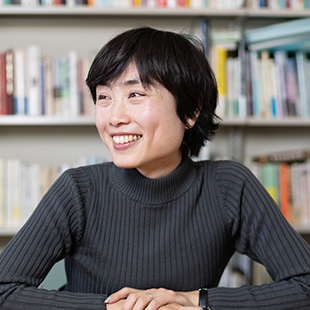
Chief Judge
Asa Ito
Director, Future of Humanity Research Center, Institute of Innovative Research, Tokyo Institute of Technology
Asa Ito is Director of the Future of Humanity Research Center at the Tokyo Institute of Technology’s Institute of Innovative Research, and Visiting Scholar at MIT (2019), specializing in aesthetics and contemporary art. After initially intending to become a biologist, she turned her academic focus to the arts while in her third year at university. She obtained her PhD in Literature in 2010, having studied aesthetics, fine arts, and culture at the University of Tokyo Graduate School of Humanities and Sociology. As author, Dr. Ito’s major works include Me no mienai hito wa sekai wo do miteiru no ka (How Do People Without Sight See the World?, Kobunsha), Domoru karada (The Stuttering Body, Igaku-Shoin), Kioku suru karada (The Remembering Body, Shunjusha), and Te no Rinri(Ethics of hands, Kodan-sha). Her work was recognized with the 42nd Suntory Prize for Social Sciences and Humanities in 2020.
JUDGES
-
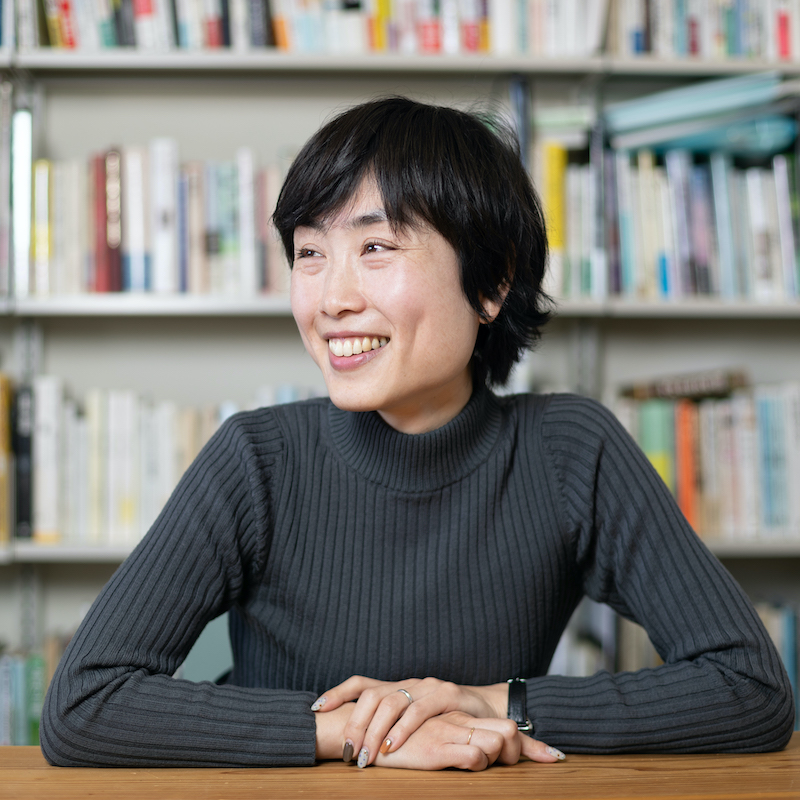
Asa Ito
Director, Future of Humanity Research Center, Institute of Innovative Research, Tokyo Institute of Technology

Asa Ito
Director, Future of Humanity Research Center, Institute of Innovative Research, Tokyo Institute of Technology
Asa Ito is Director of the Future of Humanity Research Center at the Tokyo Institute of Technology’s Institute of Innovative Research, and Visiting Scholar at MIT (2019), specializing in aesthetics and contemporary art. After initially intending to become a biologist, she turned her academic focus to the arts while in her third year at university. She obtained her PhD in Literature in 2010, having studied aesthetics, fine arts, and culture at the University of Tokyo Graduate School of Humanities and Sociology. As author, Dr. Ito’s major works include Me no mienai hito wa sekai wo do miteiru no ka (How Do People Without Sight See the World?, Kobunsha), Domoru karada (The Stuttering Body, Igaku-Shoin), Kioku suru karada (The Remembering Body, Shunjusha), and Te no Rinri(Ethics of hands, Kodan-sha). Her work was recognized with the 42nd Suntory Prize for Social Sciences and Humanities in 2020.
-
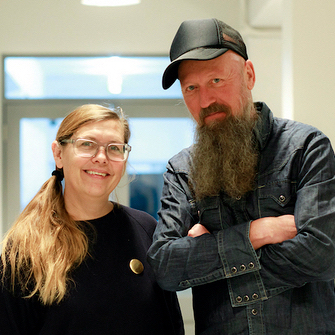
Cascoland
International Amsterdam-based network of artists, architects, designers and performers

Cascoland
International Amsterdam-based network of artists, architects, designers and performers
Projects are initiated by Fiona de Bell and Roel Schoenmakers and are executed with multi-disciplinary teams of artists and designers, promoting mobilisation, participation and networking through artistic exchange and collaboration. Since 2004 Cascoland has executed projects internationally in The Netherlands, South Africa, Brazil, Peru, Mexico, Russia, Kyrgyzstan, Palestine, Japan and in Europe.
Cascoland projects/interventions/artworks are tools to be used by participants and audiences rather than artworks to be exhibited. Cascoland interventions aim to challenge and change perceptions and create awareness about the need for social and ecological sustainable development, not only with audiences and residents, but with planners, designers, organisations and authorities as well.
Cascoland promotes a sustainable use of spaces, skills and resources. Empowerment of communities, bottom-up development of public space and the implementation of innovative solutions addressing local needs are equally important ingredients in our way of working: Art as a tool to make change happen! -

Kampire Bahana
DJ / Nyege Nyege collective

Kampire Bahana
DJ / Nyege Nyege collective
Among East Africa's most exciting DJs and a core member of Kampala's Nyege Nyege collective, Kampire’s vibrant bass-heavy sets have transported her to clubs & festivals across the world.One of Mixmag's picks for Top Ten Breakthrough DJs of 2018, Kampire's set on Boiler Room broadcast from Nyege Nyege festival was a legitimate ‘internet moment’, with thousands of shares on Facebook leading to serious FOMO from electronic music fans watching online.
Kampire’s DJ mixes have been featured on Resident Advisor, Dekmantel and Fact Magazine, which saw her chosen amongst the best mixes of 2019 on Pitchfork & Fact’s end of year lists. Her Rinse FM radio residency has seen her shine a light on other East African DJs & artists, including Hibotep, Faizal Mostrixx & Catu Diosis. -
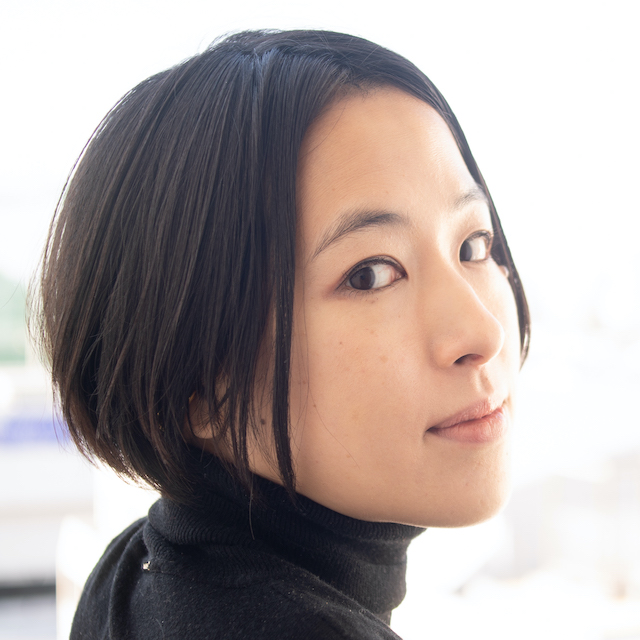
Arina Tsukada
Curator / Editor

Arina Tsukada
Curator / Editor
Arina Tsukada is an explorer in new fields of Art & Science. Founder of The Whole Universe Association since 2018. With a diverse professional background, she is known for her participation as the director of the Sound Art project “See by your ears”, led by a sound artist Evala, as well as for being the editor in chief of the Art & Science online magazine “Bound Baw” since 2016. She continues to explore new worlds of possibilities through an interdisciplinary approach. Using art and science, and her multidisciplinary background, she has organized multiple conferences, exhibitions, media-productions, and the other spectacular events. She is also the author of the books “Art Science is (2018)”, co-author “Information Umwelt - Guidebook for playing between AI and human body(2019).”
PRIZE
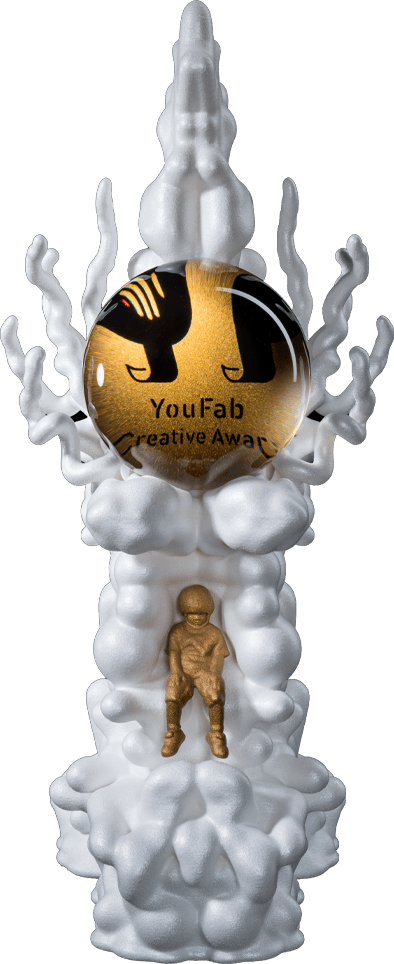
THRONE©️Kohei Nawa
Kohei NAWA
Born in 1975. Currently based in Kyoto.
Director of “SANDWICH,” a creative platform for production established in 2009 in Fushimi, Kyoto.
Website:http://kohei-nawa.net/
-

Trophy / 2000 USD
-

Trophy / 1000 USD
-

Certificate / 500 USD
-

Certificate
SPECIAL PRIZE Panasonic PRIZE
For the YouFab2021 Special Award "Panasonic Award", we will seek works that hope to improve the society and our lives under the theme "Democratic experiment(s)."
SCHEDULE


- Entry Period
- Sunday, August 1, 2021 - Sunday, October 31, 2021 12:00 (Japan time, noon)
- Initial Review Results
Announcement - Mid-Mid-December, 2021
- Final Review Results
Announcement - Early January, 2022
- Award Ceremony / Exhibition
- Early February 2022
HOW TO SUBMIT
-

STEP 1
Create an AWRD account
Entries for these awards should be submitted on AWRD.com (https://awrd.com). Entrants will need to create their own AWRD.com user account (free of charge) to submit their entry.
-

-

STEP 3
Submit your entry
There is no limit to the number of entries you may submit. If submitting multiple entries, please prepare an entry form for each submission.
WHAT YOU NEED TO PREPARE
1
Photos *Required
One main photograph of the submitted work *Required
Two supplementary photos *Optional
※Accepted image formats: JPEG, GIF, PNG
※Recommended image size is around 10MB
2
Video introducing your submission (no more than 5 minutes)
If privacy settings are set so as to require a password for viewing, please be sure to include the password on the entry form. *Optional
3
Explanation of your submission
Please include an explanation of the concept of the work, the reason why you made it, the creation process, and the specifications.
Submission Language
YouFab accepts applications written in languages other than English. However, please be aware that the judgment will be made in English so we recommend that there be an English explanation along with the submitted language. Any applications that are not in English will be translated by the YouFab committee using a free online translating tool for the judges to review.
Online Application
Please note that your session may timeout if you stay on the entry form for a long period of time. It is recommended to first save the contents you wish to register onto the entry form offline and then submit the form.
Submission Photo
When you submit your work to AWRD website, the main submission photo will be featured on this website.





